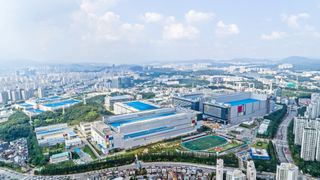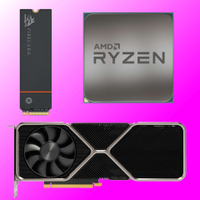Samsung and TSMC have been eyeballing the Middle East for new locations to build chip factories, says WSJ
Don't get too excited; this is probably just about having even more AI stuff.

TSMC and Samsung are the world's largest chip manufacturers, with the majority of their manufacturing plants located in their native countries, Taiwan and South Korea. Both also have plants in the USA, either fully running or still under development, and now it looks like they're both planning on expanding their facilities in the Middle East.
That's according to a news report by the Wall Street Journal (via The Verge), which claims that TSMC and Samsung have recently visited the United Arab Emirates with a view to building new chip foundries in that country.
This might seem like a bit of an odd choice for a location, as the UAE isn't particularly known for having an abundance of water (necessary for chip making) and unlike the USA and Europe, it doesn't have a long history of micro-electronics manufacturing, either. But these two stumbling blocks are somewhat countered by something that the UAE does have a lot of—money and a keen interest in AI investment.
The latter is likely to be the primary motivation behind TSMC and Samsung's visit to the UAE because as both companies have discovered with building new chip fabs in the USA, it's monumentally expensive to get such things started.
Amazon, AMD, Google, and Nvidia employ the services of TSMC (and Samsung, but to a much lesser extent) to make all of their hulking AI-focused chips. However, investors are somewhat twitchy over the fact that the entire industry is dependent on just one or two countries to meet the ever-growing demand for AI chips.
Not that we'd see a UAE-based chip plant any time soon, though. Even if all parties shake hands and sign papers tomorrow, it'll be years before a fully-fledged foundry is spitting out massive chips with ideal yields. Some of the problems can be resolved by just spending an awful lot of money but even then, staffing the facilities will take a while to get right.
And despite the wealth of the UAE, it's unlikely to be doing this just so the manufacturing plants can churn out millions of low profit margins chips—it'll be looking to make a decent return on any fab investment, so that pretty much just means AI megachips.
The biggest gaming news, reviews and hardware deals
Keep up to date with the most important stories and the best deals, as picked by the PC Gamer team.
Without being privy to inside information, it's impossible to tell just how much it costs to make one Hopper H100, for example, but given that AMD and Nvidia's data center profits are huge, it's obvious where the big money is and why the UAE is especially interested in becoming part of it all.
PC gaming has always been an expensive hobby, of course, but it would be nice if there was a concerted effort by the industry to lower costs and pass that on to the consumer. Wishful thinking, I know, but one can dream, yes?
Best CPU for gaming: Top chips from Intel and AMD.
Best gaming motherboard: The right boards.
Best graphics card: Your perfect pixel-pusher awaits.
Best SSD for gaming: Get into the game first.

Nick, gaming, and computers all first met in 1981, with the love affair starting on a Sinclair ZX81 in kit form and a book on ZX Basic. He ended up becoming a physics and IT teacher, but by the late 1990s decided it was time to cut his teeth writing for a long defunct UK tech site. He went on to do the same at Madonion, helping to write the help files for 3DMark and PCMark. After a short stint working at Beyond3D.com, Nick joined Futuremark (MadOnion rebranded) full-time, as editor-in-chief for its gaming and hardware section, YouGamers. After the site shutdown, he became an engineering and computing lecturer for many years, but missed the writing bug. Cue four years at TechSpot.com and over 100 long articles on anything and everything. He freely admits to being far too obsessed with GPUs and open world grindy RPGs, but who isn't these days?
Most Popular







